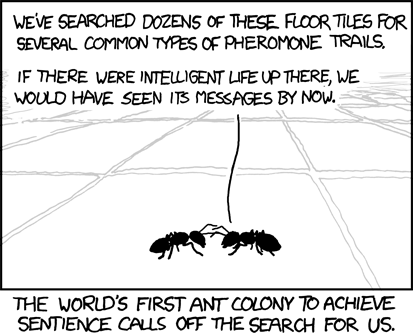At a vote of the class, I cancelled my night lecture today so that class members could participate in the day’s festivities. Having no other plans per se, I came home, rode my bike for an hour, and then I went out to pick up some dinner. When I left for dinner, I left lights on upstairs that are visible from the street, and when I returned home I neglected to turn them off. A few minutes ago, I heard some pelting noises against the front of the house and emerged to find that some neighborhood teenagers have decorated my house with complimentary raw omelets.
I don’t celebrate Halloween by my own choice. I know it means a lot to many of you, and that’s fine. I choose to abstain. I see in the behavior of Halloween something that says much about the political climate today and the focus of the electorate. We’ll leave discussion of the attire and the premise for private conversations.
Following some thought, I think I realized why the teenagers did what they did. You see, they think they are entitled to candy because it’s Halloween and I am home (or at least the lights made them think I was). Nevermind that Trick or Treat is for children (which they insist that they are not unless it plays to their advantage) and that when these shenanigans occur it’s vandalism. I personally don’t feel like supporting by participation in a festival that encourages us to garb our children like servants of the adversary and send them to extort candy from strangers under veiled threats of vandalism. If I gave out candy, that would be my choice, my prerogative. They however see it as my duty to give and their honor to receive.
Hence Halloween reflects in its participants the entitlement attitude of the rising generation. They are not special because they exist, and they do not have a right to anything in my house because they knock on the door. I read stories today about looting on Long Island after Sandy cleared out, with people taking from stores and homes because those people have been robbing them. That is not civilized behavior, and so I refuse to join in let alone endorse it. They are teenagers. They are too old to trick or treat. They ought to be out helping other children have fun rather than selfishly insisting the fun must continue for them whatever the cost and whatever my attitude about it.
Most of the Halloween focus I see is self-adulation, self-aggrandizement, and selfishness. It is about parties and candy and frolic, which are fine, but some people are at work, and quite frankly that’s where I would rather be. Tomorrow, the internet will be plastered with pictures in an attempt to one-up everyone else on how much fun they had tonight. Some of the males I know will oogle the pictures of women dressed with far less clothing than is wise or normal. It’s an excuse for people to behave and dress as they wish they were, and I don’t like some of what I see. Meanwhile, I’ll be cleaning off the egg. Thank goodness my car is in the garage.
As we think about an election and a natural disaster, I do not think we can long survive a phony civilization such as is presently constituted. We have people who act presidential and act like they care and act like they are wise, but it’s all an act. They think they are special, that they deserve things, and worst of all that they can right something they perceive in my as wrong by committing another wrong. You cannot make things right by committing a crime. You cannot make civilization out of people who do not regard the law. I feel sad for these kids. They may never grow up, and we will all be poorer because of it. We’ll spend all of our lives taking care of them.








